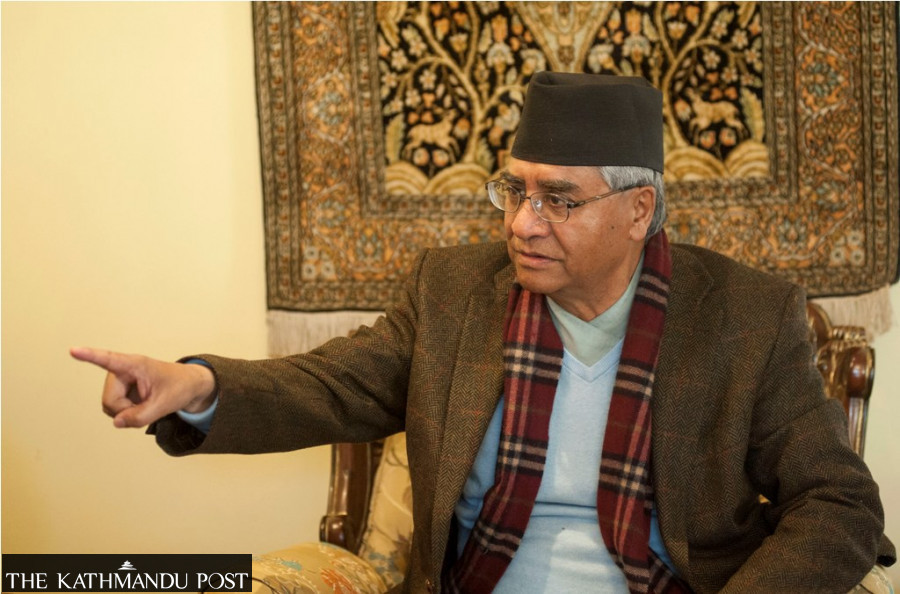Politics
Legal hurdle in Cabinet expansion as ruling-opposition deadlock persists
Main opposition CPN-UML skips an all-party meeting called by the prime minister to find a way out of the crisis.
Tika R Pradhan
An all-party meeting called by Prime Minister Sher Bahadur Deuba on Thursday to seek ways to end the ongoing House obstruction was unsuccessful because the main opposition, CPN-UML, was a no-show.
Deuba is under pressure to expand his Cabinet, but there is no law to administer oaths to his ministers after the ordinance related to the administration of oath brought by the past government expired on September 15.
Although Deuba on September 22 appointed his party’s Narayan Khadka as foreign minister, who was sworn in by the President the same day, the swearing-in has been challenged at the Supreme Court.
On Tuesday, Bishal Neupane, an advocate, filed a petition at the Supreme Court claiming that the administration of oath to the newly appointed Foreign Minister Narayan Khadka was unconstitutional because there is no law on oath-taking.
Thursday’s meeting was intended to seek ways to end the ongoing obstruction by the main opposition. But leaders of the ruling coalition have asked the prime minister to make one more effort and if that fails the only option could be to end the House session and bring an ordinance so as to pave the way for him to expand the Cabinet.
“We have asked the prime minister to make one more effort to negotiate with UML but if that also fails, an ordinance could be brought by ending this session, which the opposition has not allowed to run anyway,” said Rajendra Pandey, vice-chairman of the CPN (Unified Socialist), who was present at the Baluwatar meeting.
The Deuba government has no option than to end the current session and bring an ordinance to give his Cabinet a full shape as the main opposition is not going to relent until Speaker Agni Sapkota acknowledges its notice to sack its 14 dissident lawmakers. Even if the government introduces a bill on oath, it will take at least a month to become law.
The coalition government drew widespread criticism after it brought an ordinance to amend the Political Parties Act 2017 with the sole objective to split the main opposition party a day after proroguing the federal parliament on August 17.
If the House is prorogued and ordinance on oath is brought, which is a likely scenario for the Deuba government, it could spark criticism from all quarters of society as the coalition partners, including the Nepali Congress, CPN (Maoist Centre), leaders of CPN (Unified Socialist) and Janata Samajbadi Party had criticised the then prime minister KP Oli for trying to rule the state with ordinances by bypassing Parliament.
But now they also have resorted to ruling the state through ordinance and the main opposition CPN-UML has held the Parliament hostage to serve its political interests. After dissolving the House of Representatives twice only to be reinstated by the Supreme Court, the UML leadership has been hell-bent to prove that Parliament cannot function and therefore its move to call snap polls was right.
Through Law Minister Gyanendra Bahadur Karki, UML Chairman KP Sharma Oli has already sent a message to the prime minister that he would support the government for an early polls as Parliament has become irrelevant.
“The government hasn’t been able to form a full-size Cabinet even after more than 70 days; the House is not functioning; everything is a mess,” said Subas Nembang, deputy leader of the UML Parliamentary Party. “Doesn't this all prove that our move [to dissolve the House and call snap polls] was right?”
Earlier, there was only Oli and his coterie trying to derail the democratic system but now, according to political analysts and observers, all five parties in the coalition are working in tandem to undermine the constitution.
“Earlier, everyone criticised Oli for trying to derail the democratic system but now all the parties are involved in the game,” said Rajendra Maharjan, a political analyst. “All major parties are trying to throw the existing political system down the drain.”
He said the main opposition CPN-UML has its own political interests to push the country towards early polls and is therefore obstructing the House. It seems that both the ruling coalition and the main opposition parties are colluding to push the nation towards early polls, he said.
Another political analyst Khagendra Prasai said it was not only Oli who tried to derail the democratic system but all parties are in crisis when it comes to adhering to democratic practices.
“When Oli was in power, we saw his actions and now the coalition is following in his footsteps,” said Prasai, an associate professor of Philosophy at Nepal Open University.




 13.12°C Kathmandu
13.12°C Kathmandu














